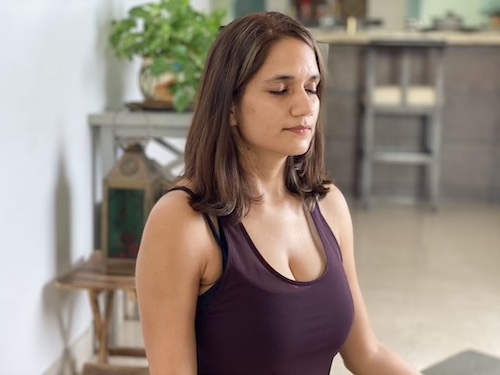Today is International Day of Meditation and a good day to clarify a few myths around this powerful practice. I’ll also be covering some of the questions you have asked me on my Instagram Page on meditation for beginners.
What is meditation?
Meditation is a practice to calm the mind. In order for the mind to be calm, it needs to hold on to something. This something is called the object of meditation or your home base, it helps to anchor your mind. This object (or home base) can be a mantra, a religious symbol, parts of the body, a deity, or any other spiritually conducive object that appeals to you.
How do you practice meditation?
First, you choose your home base – I would recommend the breath. Because breath is an uninterrupted, rhythmic, indefinite process that never stops. That’s why it’s a great object of meditation.
After you’ve chosen your home base, you should choose a posture. You can simply sit on a chair or cross your leg on the floor or any other way that’s comfortable for you. You do not have to force yourself into complicated yogic postures to start meditating. However, you should try and keep the spine comfortably upright and minimize slouching during your practice.
Now to start meditating you assume your posture and try to concentrate on your object of meditation, which is the breath in this case. Many thoughts will come and you will get distracted, for some time you may even forget that you were meditating. All of this is normal. Don’t give up here, this is where the practice begins. Because once you get distracted by thoughts, a moment will come when you will realize that you were supposed to be meditating. That moment of awareness is very important! As soon as you remember, simply go back to focusing on your breath. In the beginning, you will need to do this repeatedly and frequently, as the mind is not at all used to concentrating.
However, with regular practice, you’ll be able to concentrate for longer periods of time. In the beginning, maybe the mind doesn’t sit still for even 5 seconds, that’s fine. Keep practicing, keep cherishing those moments of awareness, and within a few months of practice, you’ll notice improvement. And maybe the first milestone will be simply holding your attention on your breath for 1 complete uninterrupted minute – and that’s awesome.
Here’s a beginner-friendly breath awareness meditation practice that was recorded Live:
When I do meditation, I can’t concentrate, there are always thoughts in my mind. How to stop them?
An untrained mind will run away with thoughts easily. But that is exactly the reason we should meditate because with repeated practice we get stronger at keeping our mind on our chosen object of meditation. Just like you do reps with weights at the gym, you do reps in meditation. A rep in meditation is that moment when you suddenly remember that you were supposed to be meditating and then come back to your practice again. This needs to be done over and over again. Here’s a step-by-step look.
- you’ll try to concentrate on the breath
- the mind will go elsewhere within seconds
- at some point you’ll remember, and come back to your breath
- the mind will get distracted again
- again you’ll remember and start focusing on the breath
- and so on…
The more you repeat this, the stronger your concentration becomes. The mind will still run away but not as frequently, you’ll get longer periods of peace and stillness before you’re distracted again.
View this post on Instagram
How can we take control of thoughts in meditation?
One should not try to control or suppress thoughts during meditation. That is counterproductive and will make them even more powerful. Instead, give them a vast playing field and allow them to rise and go on their own. As a thought rises you simply observe till it goes away. This is often likened to watching clouds go by, each thought is like a cloud that will pass by eventually. During that time you practice non-reaction and non-judgment towards it.
Additionally, you can also practice the ‘labeling’ technique. As a thought arises, you assign a label to it. These labels could be, fear, judgment, anger, planning, work, etc. By noting and giving a label to your emotions, you can reduce their intensity. Why this works is that as soon as you start thinking about your emotions in words, a different part of the brain becomes active that helps you regulate your reaction.
View this post on Instagram
On a daily basis, how many minutes should we do meditation?
At least 5 mins a day if you’re just starting out. But a minimum of 20-30 mins should be practiced to start seeing tangible benefits within 8-10 weeks. Most traditional schools recommend 30 mins in the morning and additionally in the evening if time permits.
How does meditation help an individual?
Meditation helps to calm down the nervous system, reduces stress hormones like cortisol, increases your gray matter, memory recall, and even improves your decision-making.
Second, it teaches us to be more mindful, which means we have better focus, concentration, and present moment awareness. When we start becoming more mindful, we also become more intuitive. Our habits, personalities, lifestyle everything starts changing naturally.
To share an example, maybe you have very strong sweet cravings right now. It is possible that after 8 weeks of regularly practicing meditation for 20-30 mins a day your food habits will completely transform. And you may have days or weeks when you don’t feel like eating anything sweet anymore. In this way, regular meditation practice starts influencing every aspect of your life. You won’t feel angry as often, you’ll be less impulsive, more in control of your emotions. Good concentration means higher productivity and better decision-making, which will go a long way in helping you find professional success. And even your behavior will naturally start becoming more positive and compassionate.
I find it difficult to meditate, what do I do?
If after trying everything you’re still struggling – try Yoga Asanas. Try different styles of yoga like Hatha, Vinyasa, Restorative, and then see after which practice your concentration is the best. Then practice that particular style more often. Some people find they’re able to meditate a lot better after Hatha practice and others enjoy Vinyasa or restorative more. You can take this quiz to help you decide which yoga style may suit you more.
View this post on Instagram
Any good apps that you recommend for meditation for beginners?
I would recommend Calm, Balance, and Insight Timer. Headspace is also a popular meditation app. If you’re a regular practitioner then you may also enjoy using a meditation timer. I am presently using Timefully and would recommend it.
You can also practice this meditation for beginners session on my Youtube Channel, this was recorded live:
I experienced deep meditation to a higher level but I stopped meditation and now I am not at the same level anymore?
Progress in meditation is not linear. It is possible for those even in advanced stages to fall back into a preliminary stage at any time during the practice. The key is consistency and non-attachment. Keep up with the practice and let go of all ego attached to your progress. Wherever you are in the journey is a blessing and we must keep doing our practice every day, results will come eventually.
Is outside chaos, disturbance ok when one meditates?
If you can avoid noise you should, if you can’t then practice anyway. It’s a lot easier to meditate when there are no external sensory distractions. That’s why sages would often go deep into caves or high up in the hills to meditate. If it’s really noisy outside, you have an extra obstacle to overcome in order to concentrate over and above your already belligerent thoughts. That’s why early morning is often more productive for meditation when external activity is minimal.
Meditation is a powerful and simple practice that can be done by anyone, anywhere, at any time. And no matter what your state of mind, your breath will always help you find some moments of peace. So, choose a method that you inherently like, find the time that’s most convenient for you, and get started. I wish you all the best in your journey.







